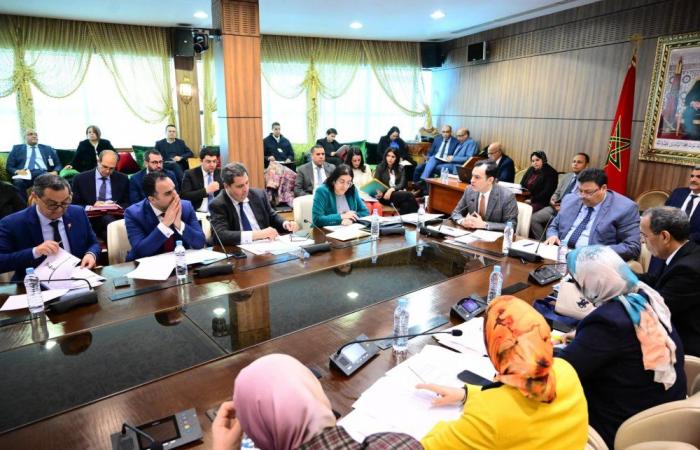A study day, organized Wednesday January 22 in Rabat by the Committee on Education and Cultural and Social Affairs at the House of Advisors on the subject of the organic bill relating to the exercise of right to strike, highlighted the issues and challenges of this fundamental text for the future of social relations in Morocco. “755 cases before the courts in a single year”. This figure, dropped straight away by the minister Younes Sekkouri in front of the experts, trade unionists and officials present, set the tone for this meeting which addresses a text which crystallizes all the tensions: the government sees it as an essential regulatory tool, the unions consider it an attack on fundamental freedoms, while the employers believe that it must be strictly regulated.
An alarming observation: increasing number of social conflicts
The figures presented by Younes Sekkouri during this study day paint a worrying picture of the current situation. In 2024, Moroccan courts had to deal with no less than 755 cases linked to obstruction of freedom of work. In detail, 418 new cases were registered during the year, while 613 judgments were handed down. Even more worrying, 142 cases remain pending, demonstrating the scale of the phenomenon and the need for effective regulation, which takes into account the balance between rights and obligations. “I believe that neither the strikers nor the employers wish to go on strike,” emphasized the minister, before adding: “Strikes involve a significant number of workers, and no one has an interest in striking or resort to justice. Negotiation must be the appropriate way to avoid this situation, and the law must compel the parties to negotiate.
Legal and constitutional issues: a fundamental debate
The discussions and exchanges which punctuated this study day showed to what extent this bill was delicate and raised fundamental questions linked to the very nature of the right to strike and its articulation with other constitutional rights. The academician and lawyer Allal Basraoui indicated on this occasion that “the strike is sociologically a relationship or a balance of power between the boss and the employees”. But this seemingly simple definition hides complex legal implications.
“The right to strike must be guaranteed, but it must not be exercised arbitrarily by employees,” specifies Mr. Basraoui, “it is this balance that must be sought.” He insists on the need to refer in this regard to the international conventions signed by Morocco, in particular those of theInternational Labor Organization (ILO). The latter clearly established that if States could legally regulate the right to strike, they could in no case limit it under the pretext of legislating.
The thorny question of definition and deadlines
And precisely, one of the most controversial points of the bill examined by the Second Chamber concerns the very definition of the right to strike. According to Mr. Basraoui, this definition should not appear in the law: “I prefer that there is not one, because this is the responsibility of case law and doctrine. Any definition will limit the judge.” And if we were to establish a definition, it should be sufficiently general to allow flexible jurisprudential interpretation, he explains.
The text provides detailed procedures and specific deadlines for exercising the right to strike, and it is precisely these details which exacerbate the divergences around this text. In the case of a strike motivated by a list of demands, the bill sets a deadline of 45 days for the public sector, with a possible extension of 15 days. For the private sector, the deadline is 15 days, also extendable by a similar period.
However, “reality shows that deadlines are generally between 3 and one week,” underlines academic Mohamed Tarik, while criticizing the rather long deadlines proposed in the project. But there is another point which arouses his concern: “The text does not allow companies where there are no unions and representative representations to exercise this right.”
The issue of vital services is another major sticking point. The text provides a list of sectors considered vital, where the exercise of the right to strike would be particularly regulated. For Mohamed Tarik, this approach is problematic, because “the ILO considers that only services requiring absolute continuity can be concerned”.
-The position of the unions: between concerns and demands
Less nuanced in their analysis, union representatives expressed their serious concerns about certain provisions of the bill. Younes Firachina, from the CDT, highlights the need “to take into consideration the proposals of the unions”, while regretting that certain proposals from the CESE and the CNDH were not taken into account in the text drawn up by the government.
And as was to be expected, the very definition of the right to strike – as it is formulated in the text of the law – is contested by the unions. It is considered too “restrictive”, in particular because it systematically prohibits political or solidarity strikes, as well as the concept of the general strike. They also denounce the generalization of salary deductions for strikers, a measure considered “punitive”. Article 8 of the draft organic law n°97.15 is particularly criticized, because it opens, according to them, the possibility for collective agreements to temporarily prohibit the exercise of a right guaranteed by the Constitution. The trade union organizations also point out the required level of representativeness, which they describe as excessive and an obstacle to the effective exercise of the right to strike. Finally, they are alarmed by the planned financial sanctions which, combined with the provisions of article 288 of the Penal Code, risk, according to them, leading to a pure and simple criminalization of any social protest movement.
But beyond the details of the text, Youssef Magouri, of the UMT, believes that the organic bill n°97.15 defining the conditions and modalities for exercising the right to strike has a fundamental dimension that is often neglected: “It is a right which concerns all citizens and not only unions”, and in a defiant tone, he questions the members of the government: “If you read this text as a simple citizen and not as ministers, would you be satisfied with it? ?»
The employers’ vision: between regulation and efficiency and a pragmatic approach to deadlines
For his part, Hicham Zouanat, president of the Employment and Social Relations Commission of the CGEM and expert with the ILO, brought a different perspective to the debate. He articulates his analysis around several fundamental questions which call into question the very foundations of the current debate. Thus, he questions in particular the absolute nature or not of the right to strike, a question which according to him has never really been resolved. This reflection naturally leads him to question the constitutional interpretation of this right in the Moroccan context. Finally, he suggested drawing inspiration from international experiences, believing that the lessons of comparative law could usefully shed light on the Moroccan legislative approach. “The problem,” he explains, “is that for 62 years, we have considered this right as absolute and without any singular or common practice.” For Zouanat, the deadlines provided for by the project are not intended to limit but to “give more time for negotiation”.
Concerning the demands list, this expert recalls that “none could be processed in less than three months. I think that a month as a deadline is reasonable.” Mr. Zouanat also defends the maintenance of sanctions in the text: “We agree to reduce them but without emptying this text of its essence. Because each text must include sanctions.”
Younes Sekkouri: “We are always open to dialogue!”
The Minister of Economic Inclusion, Small Businesses, Employment and Skills, Younes Sekkouri, made it clear during this study day that the current version of the text “does not reflect the government’s position”. On this occasion, Mr. Sekkouri provided a detailed assessment of the legislative process to date, highlighting the extent of the work accomplished with no less than 340 amendments proposed so far during the discussion of the project in the First Chamber. The minister regretted, however, that certain crucial questions, notably those relating to sanctions, had not benefited from a sufficiently in-depth debate. The same applies to the protection of the rights of strikers and the need to strengthen their ability to appeal, noted the minister. “The heart of the matter,” explains Mr. Sekkouri, “is the way in which we approach the articles of this draft text. Is there a balance between the components? He insisted on the need to respect the interests of all parties: employees, employers and public safety. The minister also announced the upcoming opening of a new round of negotiations with the trade union centers. “We are open to dialogue,” he said, “it will be initiated immediately after the detailed discussion session. We will come back to the government after the dialogue,” he assured.
It therefore seems obvious that the text needs to be further refined. This is precisely what many participants in this study day highlighted. The very definition of the right to strike and its scope of application must be clarified, as do the deadlines and notification procedures which still give rise to misunderstandings. Particular attention must be paid to the role of labor inspectors, essential players in social dialogue, as well as to the sensitive issue of sanctions and their proportionality. The protection of the rights of strikers also remains a major concern, as does the definition and scope of vital services which require more precise and consensual supervision. The major issue and challenge, as Minister Younes Sekkouri underlined, is now to transform these discussions into a balanced text, respectful of everyone’s rights and adapted to the realities of modern Morocco.






